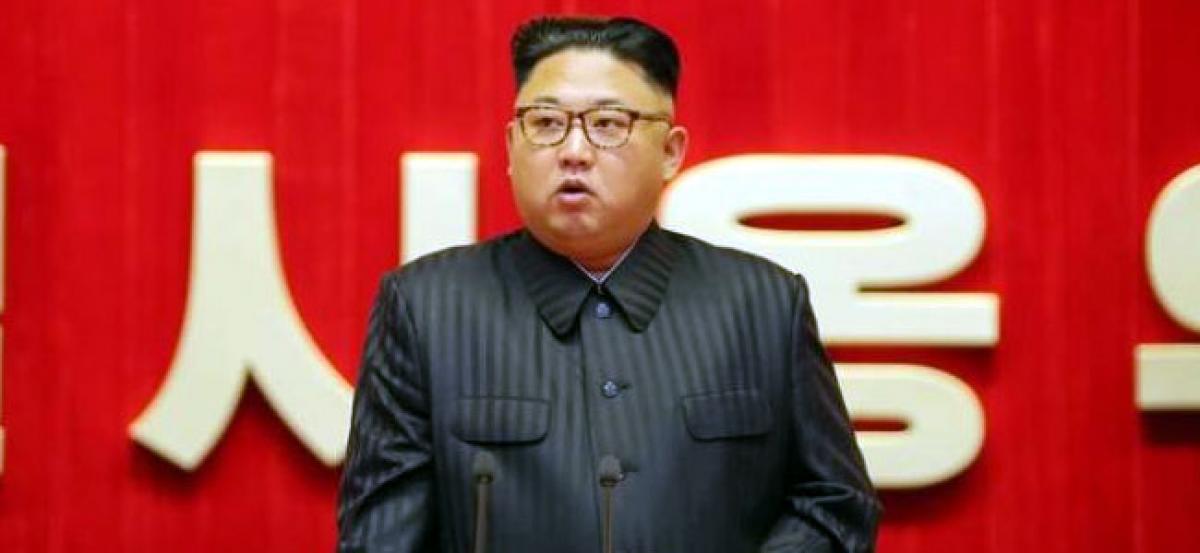Live
- NIST hosts alumni meet
- Upcoming Telugu OTT Releases: A Treat for Telugu Cinema Lovers in December
- Vedamrit Honey’ launched
- Arjun Das Brings Mufasa to Life in Tamil
- Odisha move to prepare maritime perspective plan
- Jal Jeevan Mission empowering women in rural areas: PM Modi
- Pradhan urges Nadda to set up pharmacy unit in Odisha
- Assembly winter session ends ahead of schedule
- Nepali Army Chief General Ashok Raj Sigdel Strengthens Ties With India In Four-Day Visit
- BRS MLAs, MLCs Skip Second Day of Orientation Classes
Just In

The UN Security Council imposed new sanctions on North Korea on Wednesday aimed at cutting its annual export revenue by a quarter, after Pyongyang carried out its fifth and largest nuclear test so far in September.
United Nations: The UN Security Council imposed new sanctions on North Korea on Wednesday aimed at cutting its annual export revenue by a quarter, after Pyongyang carried out its fifth and largest nuclear test so far in September.
The 15-member council unanimously adopted a resolution to slash North Korea's exports of coal, its biggest export item, by about 60 percent with an annual sales cap of $400.9 million, or 7.5 million metric tonnes, whichever is lower.
The U.S.-drafted resolution also bans North Korean copper, nickel, silver and zinc exports - and the sale of statues. Pyongyang is famous for building huge, socialist-style statues which it exports mainly to African countries.
North Korea rejected the resolution as yet another conspiracy masterminded by the United States to deny its sovereignty.
The U.S. Ambassador to the United Nations, Samantha Power, told the council after the vote that the United States was realistic about what the new sanctions on North Korea - also known as the Democratic People's Republic of Korea (DPRK) - will achieve.
"No resolution in New York will likely, tomorrow, persuade Pyongyang to cease its relentless pursuit of nuclear weapons. But this resolution imposes unprecedented costs on the DPRK regime for defying this council's demands," she said.
"In total, this resolution will slash by at least $800 million per year the hard currency that the DPRK has to fund its prohibited weapons programs, which constitutes a full 25 percent of the DPRK's entire export revenues."
That $800 million is 6.5 times the amount the World Food Programme said it needed in 2016 to fund its North Korea operations, or 1.2 million tonnes of rice at market prices.
North Korea needs 5.2 million tonnes of rice annually to meet its stated target of providing people with 573g of rice a day.
The North's foreign ministry said the Security Council was applying a double standard it had never exercised on any other country that conducted nuclear tests including its permanent members.
"There will be no greater miscalculation than to think that Obama and his henchmen can use cowardly sanctions racket to try to force us to give up our nuclear armament policy or undermine our nuclear power status," the ministry said in a statement carried by the official KCNA news agency.
North Korea has said any sanctions against its missile or nuclear programmes are a violation of its sovereignty and right to self-defence.
A South Korean Foreign Ministry spokesman said South Korea welcomed the new resolution and would pursue additional unilateral sanctions against North Korea with the United States and Japan.
Reclusive North Korea and the rich, democratic South are technically still at war because their 1950-53 conflict ended in a truce, not a peace treaty. The North regularly threatens to destroy the South and the South's main ally, the United States.
North Korea has been under U.N. sanctions since 2006 over its nuclear and ballistic missile tests. It conducted its latest nuclear test on Sept. 9.
"Sanctions are only as effective as their implementation," U.N. Secretary-General Ban Ki-moon told the council. "It is incumbent on all member states of the United Nations to make every effort to ensure that these sanctions are fully implemented."
China, believed to be the only country buying North Korean coal, would slash its imports by some $700 million compared with 2015 sales under the new sanctions, diplomats said.
Over the first 10 months of 2016, China imported 18.6 million tonnes of coal from North Korea, up almost 13 percent from a year earlier. North Korean exports to the end of 2016 will now be capped at $53.5 million, or 1 million metric tonnes.
While China said it was opposed to North Korea's nuclear tests, U.N. Ambassador Liu Jieyi accused the United States and South Korea of intensifying confrontation with North Korea by scaling up military exercises and presence.
He described the planned U.S. deployment of a Terminal High Altitude Area Defense (THAAD) anti-missile system in South Korea as "neither conducive to the realization of the goal of de-nuclearization of the Korean peninsula nor helpful to the maintenance of peace and stability on the peninsula."
The U.N. resolution blacklisted 11 more individuals, including former ambassadors to Egypt and Myanmar, and 10 entities, subjecting them to a global travel ban and asset freeze for ties to North Korea's nuclear and missile programs.
It calls on U.N. states to reduce the number of staff at North Korea's foreign missions and requires countries to limit the number of bank accounts to one per North Korean diplomatic mission amid concerns that Pyongyang had used its diplomats and foreign missions to engage in illicit activities.

© 2024 Hyderabad Media House Limited/The Hans India. All rights reserved. Powered by hocalwire.com







